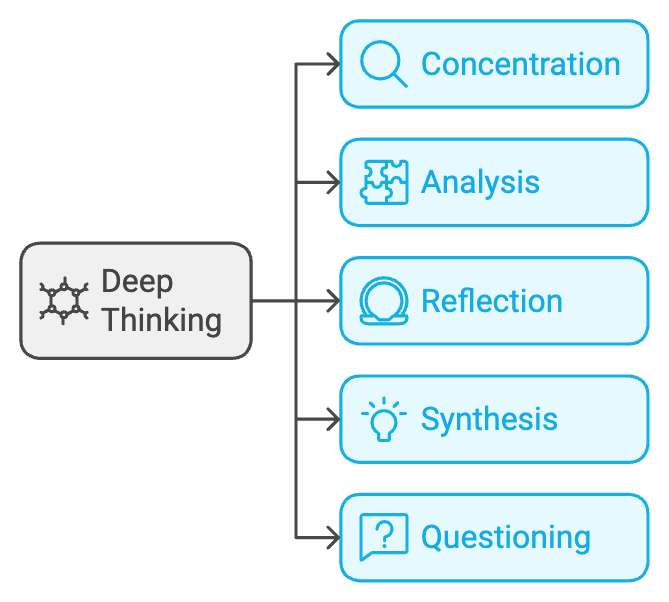Deep thinking is like taking your brain to the gym – it’s a mental workout that pushes your cognitive abilities to new heights. But what exactly does it mean to think deeply?
Deep thinking is the process of engaging in focused, analytical, and reflective thought about a subject, problem, or idea. It goes beyond surface-level observations and quick judgments, delving into the core of a matter to uncover hidden connections, patterns, and insights.
Imagine you’re solving a puzzle. Shallow thinking would be like looking at the pieces and trying to fit them together randomly. Deep thinking, on the other hand, involves examining each piece carefully, considering its shape, color, and potential connections, and then methodically piecing together the bigger picture.
Key characteristics of deep thinking include:
- Concentration: Focusing intently on a specific topic or problem without distractions.
- Analysis: Breaking down complex ideas into smaller, manageable parts.
- Reflection: Contemplating ideas from various angles and considering their implications.
- Synthesis: Combining different concepts to form new ideas or solutions.
- Questioning: Continuously asking “why” and “how” to probe deeper into a subject.
Deep thinking is not about how fast you can come up with an answer, but rather how thoroughly you can explore and understand a concept. It’s the difference between skimming the surface of a lake and diving to its depths to discover hidden treasures.

The Benefits of Deep Thinking
Engaging in deep thinking is like giving your brain a superpower boost. The benefits are numerous and can positively impact various aspects of your life. Let’s explore some of the key advantages:
- Enhanced Problem-Solving Skills: Deep thinking allows you to approach problems from multiple angles, increasing your chances of finding innovative solutions.
- Improved Creativity: By exploring ideas thoroughly, you can make unique connections and generate original thoughts.
- Better Decision Making: Analyzing situations in-depth helps you make more informed and thoughtful choices.
- Increased Self-Awareness: Reflecting deeply on your thoughts and actions can lead to greater understanding of yourself and your motivations.
- Stronger Critical Thinking: Deep thinking sharpens your ability to evaluate information and arguments critically.
- Enhanced Learning: By engaging deeply with new information, you’re more likely to retain and understand it.
- Reduced Stress: Taking time for deep reflection can help you process emotions and reduce anxiety.
- Improved Communication: Thinking deeply about your ideas helps you articulate them more clearly and persuasively.
- Greater Empathy: Considering situations from multiple perspectives can increase your understanding of others.
- Personal Growth: Regular deep thinking can lead to profound insights about yourself and your life’s direction.
As an entrepreneur, I’ve found that incorporating deep thinking into my daily routine has been transformative. It’s helped me identify unique market opportunities, develop innovative products, and navigate complex business challenges with greater confidence and clarity.
Barriers to Deep Thinking
While the benefits of deep thinking are clear, it’s not always easy to engage in this mental practice. In our fast-paced, distraction-filled world, several obstacles can hinder our ability to think deeply. Let’s identify some common barriers:
- Information Overload: We’re bombarded with data, making it challenging to focus on one topic.
- Digital Distractions: Constant notifications and the lure of social media can interrupt our thought processes.
- Time Pressure: The feeling that we need to make quick decisions can prevent us from taking time to think deeply.
- Multitasking: Trying to do multiple things at once can lead to shallow thinking across all tasks.
- Fear of Boredom: Some people avoid deep thinking because they perceive it as boring or unproductive.
- Lack of Practice: Deep thinking is a skill that needs to be developed and practiced regularly.
- Cognitive Biases: Our inherent mental shortcuts can sometimes prevent us from exploring ideas thoroughly.
- Environmental Factors: Noisy or chaotic surroundings can make it difficult to concentrate.
- Emotional State: Stress, anxiety, or other strong emotions can interfere with our ability to think deeply.
- Physical Fatigue: When we’re tired or hungry, our brain’s capacity for deep thinking diminishes.
Recognizing these barriers is the first step in overcoming them. In the next sections, we’ll explore strategies to cultivate a deep-thinking mindset and techniques to engage in this valuable mental practice.
Cultivating a Deep Thinking Mindset
Developing a deep thinking mindset is like tending a garden – it requires patience, nurturing, and consistent effort. Here are some strategies to help you cultivate this powerful mental habit:
- Embrace Curiosity: Approach the world with a sense of wonder. Ask questions and seek to understand the “why” behind things.
- Practice Mindfulness: Regular meditation or mindfulness exercises can improve your ability to focus and reflect.
- Seek Diverse Perspectives: Expose yourself to different ideas and viewpoints to broaden your thinking.
- Embrace Discomfort: Be willing to grapple with complex or uncomfortable ideas. Growth often happens outside your comfort zone.
- Develop Patience: Understand that deep insights often take time to emerge. Resist the urge for quick answers.
- Foster Self-Awareness: Regularly reflect on your thoughts, beliefs, and biases. This self-knowledge enhances your ability to think deeply.
- Cultivate Solitude: Make time for quiet reflection away from distractions.
- Read Widely: Engage with diverse and challenging reading material to stimulate your mind.
- Practice Active Listening: When conversing with others, focus on truly understanding their perspective rather than just waiting for your turn to speak.
- Embrace Failure: View mistakes and failures as opportunities for learning and deeper understanding.
As a writer, I’ve found that cultivating a deep thinking mindset has not only improved my work but has also enriched my personal life. It’s allowed me to see connections between seemingly unrelated ideas and to approach challenges with a more nuanced understanding.
Remember, developing a deep thinking mindset is a journey, not a destination. Be patient with yourself and celebrate the small victories along the way.
Techniques for Engaging in Deep Thinking
Now that we’ve explored the mindset behind deep thinking, let’s dive into some practical techniques you can use to engage in this powerful mental practice:
- The Five Whys: When faced with a problem or question, ask “why” five times to dig deeper into the root cause or core issue.
- Mind Mapping: Create visual representations of your thoughts and ideas, allowing you to see connections and explore branches of thinking.
- Socratic Questioning: Use probing questions to challenge assumptions and explore ideas from different angles.
- Journaling: Write down your thoughts and reflections regularly. This can help clarify your thinking and uncover new insights.
- Thought Experiments: Imagine hypothetical scenarios to explore complex ideas or potential outcomes.
- Analogical Thinking: Draw parallels between seemingly unrelated concepts to gain new perspectives.
- Devil’s Advocate: Deliberately argue against your own ideas to test their strength and identify weaknesses.
- SWOT Analysis: Evaluate the Strengths, Weaknesses, Opportunities, and Threats of an idea or situation.
- Freewriting: Write continuously for a set period without stopping to edit or censor your thoughts.
- The Feynman Technique: Explain a complex concept in simple terms as if teaching it to someone else.
- Meditation: Use focused meditation techniques to dive deep into a single thought or idea.
- Concept Mapping: Create visual representations of relationships between different ideas or concepts.
I’ve personally found the “Five Whys” technique incredibly useful in my marketing work. It’s helped me uncover the true motivations behind consumer behaviors, leading to more effective and targeted campaigns.
Remember, different techniques may work better for different people or situations. Experiment with these methods and find the ones that resonate most with you and your thinking style.
Deep Thinking in Problem-Solving
When it comes to tackling complex problems, deep thinking is your secret weapon. It allows you to approach challenges from multiple angles, uncover hidden solutions, and create innovative strategies. Let’s explore how deep thinking enhances problem-solving:
- Problem Definition: Deep thinking helps you accurately define the problem, ensuring you’re addressing the root cause rather than just symptoms.
- Information Gathering: By thinking deeply, you can identify what information is truly relevant and where to find it.
- Analysis: Deep thinking allows for thorough analysis of the problem and potential solutions, considering various factors and implications.
- Creative Solutions: By exploring the problem deeply, you’re more likely to generate unique and innovative solutions.
- Decision Making: Deep thinking helps you weigh pros and cons more effectively, leading to better-informed decisions.
- Implementation Planning: Thinking deeply about how to implement a solution can help anticipate and overcome potential obstacles.
- Evaluation: After implementing a solution, deep thinking aids in thoroughly evaluating its effectiveness and identifying areas for improvement.
Here’s a table summarizing the role of deep thinking in each stage of problem-solving:
| Problem-Solving Stage | Role of Deep Thinking |
|---|---|
| Problem Definition | Uncovers root causes and true nature of the problem |
| Information Gathering | Identifies crucial information needs and sources |
| Analysis | Enables thorough examination of all aspects |
| Creative Solutions | Facilitates generation of innovative ideas |
| Decision Making | Supports comprehensive evaluation of options |
| Implementation Planning | Anticipates challenges and refines strategies |
| Evaluation | Provides insights for improvement and future application |
Remember, the goal isn’t to overthink or get stuck in analysis paralysis. Instead, use deep thinking to gain a comprehensive understanding of the problem and potential solutions, then take decisive action based on your insights.
TL;DR Summary
Deep thinking is the practice of focused, analytical, and reflective thought that goes beyond surface-level observations.
It offers numerous benefits, including enhanced problem-solving, improved creativity, better decision-making, and personal growth.
While there are barriers to deep thinking in our fast-paced world, techniques like the Five Whys, mind mapping, and Socratic questioning can help cultivate this skill.
Deep thinking plays a crucial role in various aspects of life, from creative processes to decision-making, and can be particularly powerful in education and learning.
By incorporating deep thinking into daily life through practices like morning reflection, mindful consumption, and regular journaling, anyone can develop this valuable skill.
Ultimately, embracing deep thinking can lead to a more nuanced understanding of oneself and the world, equipping individuals to navigate life’s challenges with greater wisdom and purpose.
Q&A Section
- Q: How is deep thinking different from regular thinking? A: Deep thinking involves more focused, analytical, and reflective thought processes compared to regular thinking. It goes beyond surface-level observations to explore ideas thoroughly, make connections, and uncover insights that might not be immediately apparent.
- Q: Can deep thinking be learned, or is it an innate ability? A: While some people may have a natural inclination towards deep thinking, it is definitely a skill that can be learned and improved with practice. Like any cognitive skill, the more you engage in deep thinking, the better you become at it.
- Q: How much time should I dedicate to deep thinking each day? A: There’s no one-size-fits-all answer, but even 10-15 minutes of focused reflection daily can make a significant difference. As you become more comfortable with deep thinking, you might find yourself naturally incorporating it into various aspects of your day.
- Q: Can deep thinking lead to overthinking or analysis paralysis? A: While deep thinking involves thorough analysis, it shouldn’t lead to overthinking or paralysis. The goal is to gain insights and make better decisions, not to get stuck in endless contemplation. If you find yourself overthinking, it might help to set time limits for your deep thinking sessions or to focus on actionable outcomes.
- Q: How can I encourage deep thinking in my team or classroom? A: You can foster deep thinking by asking open-ended questions, encouraging discussion and debate, providing time for reflection, and creating a safe environment where people feel comfortable sharing their thoughts and ideas. Using techniques like the Five Whys or thought experiments can also stimulate deeper thinking.
Deep Thinking Quiz
Test your understanding of deep thinking with this quick quiz:
- Deep thinking involves: a) Quick decision-making b) Focused, analytical thought c) Memorizing facts d) Following instructions precisely
- Which of these is NOT a benefit of deep thinking? a) Enhanced creativity b) Improved problem-solving c) Faster reaction times d) Better decision-making
- The “Five Whys” technique is used to: a) Make quick decisions b) Memorize information c) Uncover root causes d) Avoid difficult questions
- Deep thinking in the digital age: a) Is impossible due to distractions b) Requires completely avoiding technology c) Can be enhanced with the right digital tools d) Is only necessary for academics
- Which of these is a good way to incorporate deep thinking into daily life? a) Multitasking constantly b) Avoiding all difficult questions c) Morning reflection d) Consuming as much information as possible without pausing
Answers:
- b) Focused, analytical thought
- c) Faster reaction times
- c) Uncover root causes
- c) Can be enhanced with the right digital tools
- c) Morning reflection
Scoring:
- 5 correct: Deep Thinking Master! You have a solid understanding of deep thinking principles.
- 3-4 correct: Deep Thinking Apprentice. You’re on the right track, but there’s room to deepen your understanding.
- 1-2 correct: Deep Thinking Novice. Consider revisiting the article to reinforce your understanding of deep thinking concepts.
- 0 correct: Deep Thinking Beginner. Don’t worry! Everyone starts somewhere. Re-read the article and try the quiz again.





